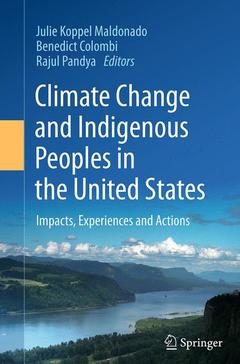Description
Climate Change and Indigenous Peoples in the United States, Softcover reprint of the original 1st ed. 2014
Impacts, Experiences and Actions
Coordinators: Maldonado Julie Koppel, Colombi Benedict, Pandya Rajul
Language: English
Subjects for Climate Change and Indigenous Peoples in the United States:
Keywords
Changing Streamflow; Climate Adaptation; Climate Change and Indigenous Peoples of the USA; Climate Change and Tribal Communities; Climate Change in Alaska; Traditional Knowledge in Climate Change Adaptation; Tribal Traditional; Water Resources and American Indians; climate change; Climate change management
Publication date: 08-2016
Support: Print on demand
Publication date: 05-2014
174 p. · 15.5x23.5 cm · Hardback
Description
/li>Contents
/li>Biography
/li>Comment
/li>
With a long history and deep connection to the Earth?s resources, indigenous peoples have an intimate understanding and ability to observe the impacts linked to climate change. Traditional ecological knowledge and tribal experience play a key role in developing future scientific solutions for adaptation to the impacts. The book explores climate-related issues for indigenous communities in the United States, including loss of traditional knowledge, forests and ecosystems, food security and traditional foods, as well as water, Arctic sea ice loss, permafrost thaw and relocation. The book also highlights how tribal communities and programs are responding to the changing environments. Fifty authors from tribal communities, academia, government agencies and NGOs contributed to the book.
Previously published in Climatic Change, Volume 120, Issue 3, 2013.
Written by a panel of experts in the effects of climate change on tribal communities
Proposes strategies of adaptation and gives a timely report on climate change impacts on indigenous communities
Applicable to all indigenous communities facing climate change




